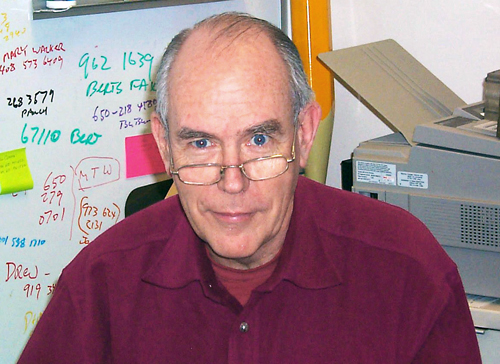A scientist associated with Portland State in the fields of engineering and computer science has just been rewarded for his years of influential research.
A programming pioneer
A scientist associated with Portland State in the fields of engineering and computer science has just been rewarded for his years of influential research.

Ivan Sutherland recently received the Kyoto Prize in Advanced Technology for his Sketchpad program, a 1960s-era computer program that turned vague sketches into defined blueprints, forever changing the field of computer graphics.
Sutherland received a cash prize of $600,000 in addition to the award and is expected to gain significant recognition as a result of the honor.
While Sutherland was unavailable for comment at the time of this story’s publication, a statement released by the Kyoto Prize spoke highly of his work.
“Dr. Sutherland has been responsible for many pioneering advances and fundamental contributions to the computer graphics technology used for information presentation, as well as the interactive interfaces that allow people to utilize computers without the need for programming,” it said.
Sutherland’s co-workers and associates were eager to praise him, admiring his body of work and explaining that he is extremely deserving of the prize.
“It is something that we can really all be proud of—having a colleague receive such a prestigious award,” said Timothy Anderson, associate professor of engineering and technology management at PSU’s Maseeh College of Engineering and Computer Science.
The Kyoto Prize in Advanced Technology for information science is only awarded every four years because the prize rotates each year across different areas of advanced technology, said Warren Harrison, professor of computer science at PSU. Past winners are household names for anyone in the field, he explained.
And this isn’t the first time he’s won a big-time award, either.
“In addition to the Kyoto Prize, all of them, including Sutherland, also have won the ACM Turing Award, which is the most prestigious award any computer scientist can receive,” Harrison said.
Sutherland will finally be receiving the recognition he deserves for his years of work and study, several colleagues said. Many pointed out that Sutherland’s current work isn’t directly related to his award-winning program, which speaks volumes about his overall body of work.
“We have one faculty member, Feng Liu, who is primarily involved in computer visualization and 3-D rendering. However, it is important to realize that Ivan’s prize is for work he did years ago in the 1960s–80s. Today, his research interests are in something else totally: asynchronous computation,” Harrison said. The Kyoto Prize will expand his reputation outside of the computer science community, he explained, but for many in the field, Sutherland was already well known.
“So to the extent his presence at PSU will attract students and visibility, I don’t see it changing significantly. It’s kind of like having a faculty member that already has a Nobel Prize. Winning a second one doesn’t necessarily make them more visible or prominent than they already are, beyond a short pulse of publicity.
“But at the end of the day, prize or no prize, you’ve got a brilliant scientist that is advancing the state of the art. That is the real value added; the prize is just an acknowledgement of that brilliance,” Harrison said.
Sutherland’s associates believe that as he receives more recognition, his ideas and influence will reach a greater audience. His body of work will gain more weight in the future scientific community, they said.
“Students that have studied fundamental computer graphics have been introduced to his contributions for decades in various graphics algorithms for clipping and transformations. So while they may not be following in his footsteps, they are standing on his shoulders,” Harrison said.
“His relative obscurity on campus was due to little knowledge of the Turing Award outside the computing community and the fact that Ivan’s interaction at PSU appears to be limited within the Maseeh College of Engineering, though he interacts regularly and quite freely with faculty and students,” Harrison said.
“You can find him most weekdays eating lunch outside the CS department, surrounded by students and faculty.”




